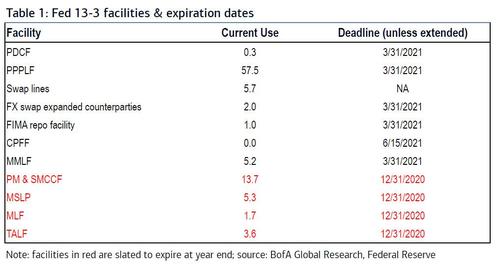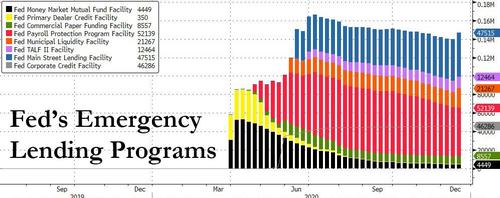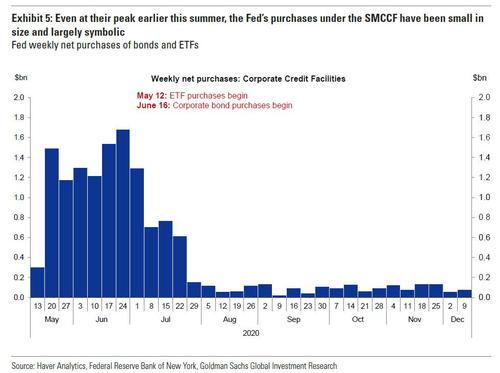Update 6:50pm: House Speaker Pelosi and Senate Minority Leader Schumer’s issued a joint statement on the Coronavirus Relief & Omnibus Agreement:
“Today, we have reached agreement with Republicans and the White House on an emergency coronavirus relief and omnibus package that delivers urgently needed funds to save the lives and livelihoods of the American people as the virus accelerates.
“We are going to crush the virus and put money in the pockets of the American people. As part of the agreement, Democrats have secured provisions that include:
- Accelerating vaccine distribution and crushing the coronavirus: The bipartisan COVID relief package finally recognizes that we cannot get our economy working unless we can get the coronavirus under control. The package provides billions in urgently need funds to accelerate the free and equitable distribution of safe vaccines to as many Americans as possible as soon as possible, to implement a strong national testing and tracing strategy with billions reserved specifically for combating the disparities facing communities of color, and to support our heroic health care workers and providers.
- Ends surprise billing: The package includes bipartisan, bicameral legislation that will end surprise billing for emergency and scheduled care.
- Strong support for small business: Democrats secured critical funding and policy changes to help small businesses, including minority-owned businesses, and nonprofits recover from the pandemic. The agreement includes over $284 billion for first and second forgivable PPP loans, expanded PPP eligibility for nonprofits and local newspapers, TV and radio broadcasters, key modifications to PPP to serve the smallest businesses and struggling non-profits and better assist independent restaurants, and includes $15 billion in dedicated funding for live venues, independent movie theaters, and cultural institutions. The agreement also includes $20 billion for targeted EIDL Grants which are critical to many smaller businesses on Main Street.
- Community Development Financial Institutions and Minority Depository Institutions: The agreement includes dedicated PPP set-asides for very small businesses and lending through community-based lenders like Community Development Financial Institutions (CDFIs) and Minority Depository Institutions (MDIs); $9 billion in emergency U.S. Treasury capital investments in CDFIs and MDIs to support lending in low-income and underserved communities, including persistent poverty counties, that may be disproportionately impacted by the economic effects of the COVID–19 pandemic; and $3 billion in emergency support for CDFIs through the CDFI Fund to respond to the economic impact of the pandemic on underserved low-income and minority communities.
- Rental assistance: Democrats secured $25 billion in critically needed rental assistance for families struggling to stay in their homes and an extension of the eviction moratorium.
- Strengthens the Low Income Housing Tax Credit: The package enhances the LIHTC to help increase affordable housing construction and provide greater certainty to new and ongoing affordable housing projects.
- Direct payment checks: Democrats secured a new round of direct payments worth up to $600 per adult and child, also ensuring that mixed-status families receive payments.
- Strengthened Earned Income Tax Credit & Child Tax Credit: The agreement helps ensure that families who faced unemployment or reduced wages during the pandemic are able to receive a strong tax credit based on their 2019 income, preserving these vital income supports for vulnerable families.
- Supports paid sick leave: The agreement provides a tax credit to support employers offering paid sick leave, based on the Families First framework.
- Employee Retention Tax Credit: The agreement extends and improves the Employee Retention Tax Credit to help keep workers in the jobs during coronavirus closures or reduced revenue.
- Enhanced Unemployment Insurance benefits: Democrats averted the sudden expiration of Unemployment Insurance benefits for millions and added a $300 per week UI enhancement for Americans out of work.
- Nutrition assistance for hungry families: Democrats secured $13 billion in increased SNAP and child nutrition benefits to help relieve the historic hunger crisis that has left up to 17 million children food insecure.
- Education and child care: The agreement provides $82 billion in funding for colleges and schools, including support for HVAC repair and replacement to mitigate virus transmission and reopen classrooms, and $10 billion for child care assistance to help get parents back to work and keep child care providers open.
- Historic expansion of Pell Grants: The package includes the largest expansion of Pell Grant recipients in over a decade, reaching 500,000 new recipients and ensuring more than 1.5 million students will now receive the maximum benefit.
- Broadband access: The agreement invests $7 billion to increase access to broadband, including a new Emergency Broadband Benefit to help millions of students, families and unemployed workers afford the broadband they need during the pandemic.
- Fights the climate crisis: The agreement includes sweeping clean energy reforms, R&D enhancements, efficiency incentives, and extends clean energy tax credits to create hundreds of thousands of jobs across the clean economy. The package also phases out superpollutant HFCs, positioning the U.S. to lead the world in avoiding up to 0.5 degree Celsius of global warming.
- WRDA: The agreement includes the bipartisan Water Resources Development Act of 2020, creating good-paying jobs strengthening and improving the vital water infrastructure that Americans rely on while unlocking the Harbor Maintenance Trust Fund.
- Global Health: Democrats secured an additional $3.36 billion for a total of $4 billion for GAVI, the international vaccine alliance, recognizing that we are not truly safe until the whole world is safe from the coronavirus.
“Importantly, the final agreement does not include several dangerous Republican proposals, including a long-demanded GOP provision that could unjustly put the health of workers at risk and take away their legal recourse, as well as an 11th hour attempt to sabotage the incoming administration’s ability to stabilize the economy and save jobs.
“State and local governments will certainly need additional funding to prevent the senseless layoffs of heroic essential workers and critical service cuts. The agreement provides some important new targeted funds for state and local government functions that will help alleviate their overall budget burdens. These targeted funds include the emergency resources for schools, $27 billion for state highways, struggling transit agencies, Amtrak and airports, $22 billion for the health-related expenses of state, local, tribal and territorial government, and an additional year of eligibility for expenses under the CARES Coronavirus Relief Fund.
“The emergency relief in this agreement, the second largest in history only to the CARES Act, is an important first step that Democrats look forward to building on under the new Biden-Harris Administration to meet the remaining needs of the American people during this historic health and economic crisis.
“The House will move swiftly to pass this legislation immediately, so it can quickly be sent to the Senate and then to the President’s desk for his signature. With the horrifying acceleration of daily infections and deaths, there is no time to waste.”
* * *
Update 5:45pm: With just minutes to go before futures reopen for trading, Senate Majority Leader tweeted what many knew was coming following Saturday’s compromise on Fed emergency powers (see below), when he announced that a deal has been reached: “As the American people continue battling the coronavirus this holiday season, they will not be on their own.Congress has just reached an agreement. We will pass another rescue package ASAP. More help is on the way.”
Speaking on the Senate floor, McConnell said that “at long last we have a bipartisan breakthrough” that was needed to get the bill passed in the House and Senate. He added that the package will be worth about $900 billion, although he noted that the text of the legislation is still being written while Nancy Pelosi said that that the deal will take some time to write up.
The stimulus deal will include extended jobless aid, and provide direct payments to most Americans as well as money for schools and vaccine distribution. Also, according to twitter reports, Pelosi and Schumer confirm that the eviction moratorium is extended in emerging deal, with the package including $25 billion for renters.
Once the text is finalized it will be put to a vote in the House, which could come as soon as tonight. The Senate would then take it up for passage before it is sent to President Donald Trump for his signature.
* * *
Meanwhile, in a separate update, Bloomberg reports that the virus relief plan being readied for a vote in Congress would provide jobless Americans an additional 11 weeks of federal unemployment insurance benefits plus a supplemental payment of $300 a week. That includes those receiving state unemployment benefits as well as those receiving Pandemic Unemployment Assistance. Without a Congressional extension, the program was on track to expire at year-end, which would have caused millions of Americans to lose their jobless benefits. According to the report, the Pandemic Emergency Unemployment Compensation, which provided up to 13 additional weeks of jobless benefits to those who had exhausted their regular state benefits, would be extended to 24 weeks.
The extra $300-a-week supplement, similar to the extra $600 supplement that expired at the end of July, will continue through mid-March, and provide millions of Americans additional funds to pay their bills as the pandemic rages on. The extension is five weeks shorter than proposed by a bipartisan group of senators two weeks ago.
Additional aid would come in the form of stimulus checks. Families that meet the guidelines will receive $600 per adult and child, according to Senator Josh Hawley, although a final number has yet to be finalzied.
* * *
Earlier:
Late on Saturday night, Senate Minority Leader Charles Schumer (D-N.Y.) and Sen. Pat Toomey (R-Pa.) reached an agreement on language to curtail the Federal Reserve’s special lending authorities, clearing the last major hurdle on a $900 billion coronavirus-relief package.
The deal had been held up over a dispute over the Fed’s emergency lending facilities, such as its unilateral ability (with Treasury permission) to buy corporate bonds and ETFs in the open market, but at around 9 p.m. on Saturday, Republicans told Schumer that they would accept a compromise deal which would allow the Fed to retain its ability to set up emergency lending programs without congressional approval. But the Fed wouldn’t be able to replicate programs identical to the ones it started in March at the beginning of the pandemic without the approval of Congress; in short if the Fed is to restart any of the 4 emergency 13(3) programs and lending programs that are set to expire on Dec 31 (shown in red below), it will have to get Congressional approval. These four programs are the market corporate credit facility, the secondary market corporate credit facility, the Main Street lending program and the municipal credit facility.
The Fed will retain more flexibility over restarting the Term Asset-Backed Securities Loan Facility (TALF), which will be closed but can be restarted in the future. It’s worth noting that most of the expiring programs have seen little usage in recent months…
… and even the Fed’s corporate bond buying program (the SMCCF) has barely seen any action after July.
Toomey agreed to a narrower approach on dealing with potential “copycat” lending facilities. Negotiators agreed to specific language instead of merely an agreement in principle. A senior Democratic aide said that Toomey “has agreed to drop the broad language in his proposal that would have prevented the Fed Chair from establishing similar facilities in the future to the ones created in March.”
“Compromise language is being finalized and, now that this obstacle has been cleared, a final agreement on an emergency relief package is significantly closer,” the Democratic aide said.
The compromise will sweep out the $429 billion in unspent CARES Act funding for the Federal Reserve’s credit lending facilities and repurpose it as an offset for a new $900 billion coronavirus relief bill, GOP sources said. In November, Treasury Secretary Steve Mnuchin already said he would return the $429 billion in unspent CARES money to the general fund. Toomey, however, questioned that claim on Thursday.
“I’m not certain the secretary has committed to putting this in a general funds category,” he told reporters earlier in the week. “I’m not sure I interpret his comments the way you do. And there’s also the fact there are other funds in the [Exchange Stabilization Fund] account. In any case, by having the language that we have it precludes the possibility of restarting these programs from any source.”
The last minute compromise sets the stage for a vote on a Covid stimulus bill as soon as today.
With the dispute over the Fed provision resolved, a final agreement on the full coronavirus relief package was significantly closer, a senior Democratic aide told the WSJ late Saturday. Similarly, a senior House Democratic aide told The Hill that the Toomey deal sets the stage to iron out all the other less significant differences that had stalled the negotiations for weeks. “We expect remaining open items to fall into place overnight,” the aide said.
Top Senate Democrat, Chuck Schumer, told reporters he thought both the House and Senate would be able to vote Sunday on the relief bill, which is expected to be combined with a spending bill needed to avoid a partial government shutdown. The government’s current funding expires at 12:01 a.m. Monday.
“It looks like we’ll be able to. If things continue on this path and nothing gets in the way, we’ll be able to vote [Sunday],” Mr. Schumer said late Saturday night.
The republicans agreed: a spokesman for Senate Majority Leader Mitch McConnell said early Sunday that now that the Fed dispute had been resolved, “we can begin closing out the rest of the package to deliver much-needed relief to families, workers, and businesses.”
Negotiations accelerated this week after congressional leaders agreed to drop two provisions: funding for hard-hit state and local governments, which Democrats and some Republicans had sought, as well as liability protections for businesses and other entities operating during the pandemic, a top GOP priority.
The stimulus package under discussion is expected to include $300 a week in enhanced unemployment benefits, a second round of stimulus checks and funding for schools, health-care providers, vaccine distribution and small businesses. Specifically, the package will include direct stimulus checks between $600 and $700, according to a commitment GOP leaders made to Sen. Josh Hawley (R-Mo.) on Friday. Sen. Bernie Sanders (I-Vt.) worked with Hawley to include the stimulus checks.
According to the WSJ, lawmakers were working out differences Saturday surrounding the distribution and eligibility requirements of the roughly $600 direct checks expected to be included in the final bill, the duration and limits around a temporary increase in food-stamp benefits, and how to structure a relief program for live-performance venues and other industries seeking aid.
President Trump urged lawmakers to finish work on the relief package. “GET IT DONE, and give them more money in direct payments,” Trump Twitted early Sunday morning.
Momentum had slowed on Friday and Saturday after Democrats objected to a push from Toomey to insert a measure that would restrict the Fed’s ability to establish the types of emergency lending programs that it authorized in March to curb an emerging financial panic. That step would go beyond an earlier proposal to revoke $429 billion provided to the Treasury Department to backstop losses in the Fed lending programs. Treasury Secretary Steven Mnuchin last month declined to allow the programs to continue after Dec. 31, saying he didn’t think it was legally allowed. A nonpartisan congressional research arm disputed that interpretation on Thursday.
Saturday’s negotiation caps more than seven months of fruitless talks between Democrats, the White House and Senate Republicans over the size and scope of a new coronavirus relief bill. Speaker Nancy Pelosi and House Democrats proposed the $3.4 trillion Heroes Act in May and then amended their request to a $2.2. trillion relief bill in September. They ultimately settled on less than $1 trillion after extensive delays cost countless middle-class Americans their small and medium businesses..
A spokesman for Toomey hailed the deal as “an unqualified victory for taxpayers.”
“This agreement rescinds more than $429 billion in unused CARES Act funds; definitively ends the CARES Act lending facilities by December 31, 2020; stops these facilities from being restarted; and forbids them from being duplicated without congressional approval,” said Steve Kelly, Toomey’s communications director.
“This agreement will preserve Fed independence and prevent Democrats from hijacking these programs for political and social policy purposes,” he added. The GOP was worried that progressives next year might use Section 13(3) authority of the Federal Reserve Act to achieve their goals for addressing climate change or shoring up state and local budget shortfalls. The compromise deal clarifies ambiguity about whether the lending facilities will be ended by Dec. 31.
The stimulus vote, which will likely come in the next few hours, will avoid the need for Congress to adopt another short-term funding extension to prevent a government shutdown. “If things continue on this path and nothing gets in the way, we’ll be able to vote tomorrow,” Schumer said.
The vote will be a combination of a coronavirus relief package and an omnibus spending bill. The Senate would vote later Sunday before government funding expires at midnight, but Senate Majority Leader Mitch McConnell will need to get consent from all 99 of his colleagues to waive procedural hurdles. The legislation is also expected to include a package of extensions of expiring tax provisions.


